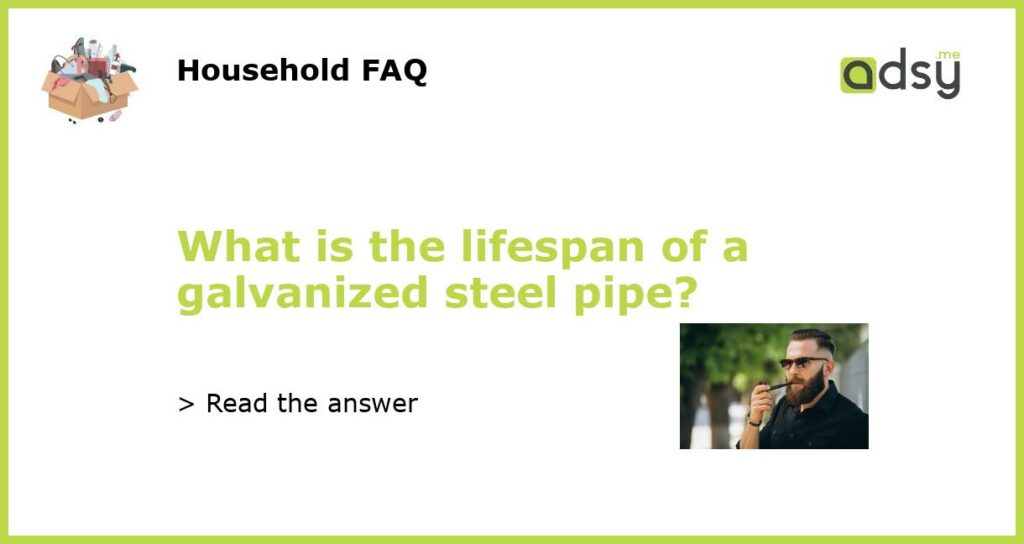The Lifespan of a Galvanized Steel Pipe
Galvanized steel pipes are a popular choice in various plumbing and construction projects due to their durability and corrosion resistance. However, like any material, they have a finite lifespan. Understanding the factors that influence the lifespan of a galvanized steel pipe can help you make informed decisions about its use and maintenance.
The Galvanization Process
Galvanized steel pipes are made by coating regular steel pipes with a layer of zinc, a process known as galvanization. This protective coating creates a barrier that prevents the underlying steel from coming into direct contact with water, air, and other elements that can lead to corrosion.
The galvanization process involves immersing the steel pipes in a bath of molten zinc. The zinc reacts with the surface of the steel, forming a series of zinc-iron alloy layers. These layers create a sturdy, long-lasting barrier against corrosion.
Factors Affecting Lifespan
The lifespan of a galvanized steel pipe can vary depending on several factors:
1. Quality of Galvanization: The quality of the galvanization process plays a crucial role in determining the lifespan of a galvanized steel pipe. Pipes that undergo a thorough and high-quality galvanization process are likely to have a longer lifespan compared to those with poor galvanization.
2. Environmental Conditions: The environment in which the galvanized steel pipe is installed greatly impacts its lifespan. Exposure to high levels of moisture, extreme temperatures, and chemicals can accelerate the corrosion process. For example, pipes installed in coastal areas with high salt content in the air may have a shorter lifespan compared to those in drier, less corrosive environments.
3. Water Quality: The quality of the water running through the galvanized steel pipe can also affect its lifespan. Water containing high levels of minerals, such as calcium and magnesium, can cause clogging and mineral buildup inside the pipe, leading to reduced water flow and eventual corrosion.
4. Maintenance and Inspections: Proper maintenance and regular inspections can extend the lifespan of a galvanized steel pipe. Routine checks for any signs of corrosion, leaks, or damage can allow for timely repairs or replacements, preventing further deterioration.
Average Lifespan
While there is no exact lifespan for galvanized steel pipes, various industry estimates suggest that they can last anywhere from 40 to 70 years. Factors such as quality of galvanization, environmental conditions, and water quality can significantly impact the actual lifespan.
In some cases, galvanized steel pipes have been known to last even longer, especially when installed in less corrosive environments and properly maintained. On the other hand, pipes exposed to harsh conditions, such as high levels of moisture and chemicals, may experience corrosion and deterioration at a faster rate.
Extending the Lifespan
To extend the lifespan of a galvanized steel pipe, several measures can be taken:
1. Regular Maintenance: Regularly inspect the pipes for any signs of corrosion, leaks, or damage. Address any issues promptly to prevent further deterioration.
2. Flushing the Pipes: Flushing the pipes with clean water periodically can help remove any mineral deposits or debris, reducing the risk of clogging and corrosion.
3. Avoiding Harsh Chemicals: Use caution when using harsh chemical cleaners or detergents that may accelerate the corrosion process. Opt for gentler alternatives whenever possible.
4. Installing Protective Coatings: Applying additional protective coatings, such as epoxy or polyurethane, to the galvanized steel pipes can provide an extra layer of defense against corrosion.
5. Water Treatment: Consider installing water filtration systems or water softeners to improve the water quality and reduce the risk of mineral buildup and corrosion.
By taking these proactive measures, it is possible to prolong the lifespan of galvanized steel pipes and ensure their continued functionality and reliability in various applications.






